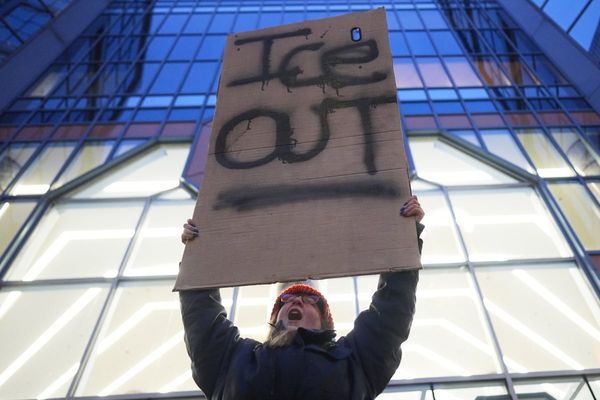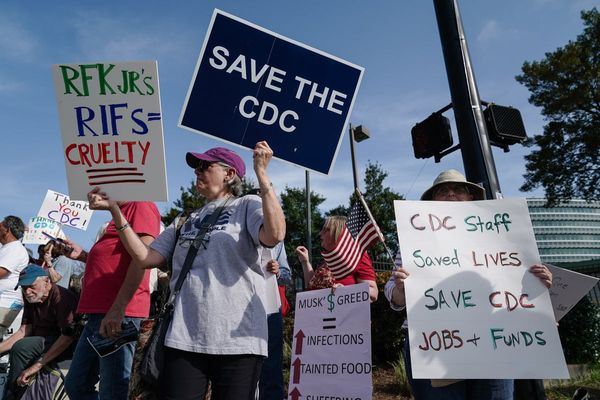
Rightwing figures from around the world descended on London last week for the inaugural conference of the Alliance for Responsible Citizenship (ARC) – a sort of quasi-thinktank fronted by the controversial Canadian psychologist Jordan Peterson.
Peterson pleaded with the audience at London’s O2 Arena to “tilt the world towards heaven and away from hell”, which, for many of the event’s main speakers, definitely did not mean worrying much at all about the climate crisis.
Three former Australian prime ministers, two former deputy prime ministers and several frontbench conservatives made the trip. Attendees were treated to a grab-bag of cherrypicked talking points that ignored the risks from climate change.
In a year likely to be the hottest on record and beset by floods, heatwaves and temperature records on land and in the ocean, speakers characterised climate change as a minor speed bump in a journey towards “human flourishing”.
According to one panellist, the author Alex Epstein (one of his books is called The Moral Case for Fossil Fuels), lots more fossil fuels would make the world a much better place.
Peterson himself has been corrected by experts for his opinions about climate models and the role of carbon dioxide in warming, while also interviewing many contrarian scientists.
He has defined the term “net zero” as a “conspiracy run by narcissistic poseurs” who will “worsen environmental conditions” and are “hellbent” on power.
Several high-profile Australian conservative politicians were in attendance, along with the three former prime ministers (Scott Morrison, Tony Abbott and John Howard) and two former deputy PMs (Barnaby Joyce and John Anderson).
Frontbenchers from the conservative opposition Angus Taylor, Andrew Hastie and Dan Tehan were there, as well as senators Jacinta Nampijinpa Price and James Paterson. Several other Australian federal and state politicians and rightwing figures also reportedly attended, including the New South Wales independent MP Mark Latham and former NSW premier Dominic Perrottet.
The new speaker of the US House of Representatives, Mike Johnson, sent a recorded message, and the former speaker Kevin McCarthy was there in person. The UK cabinet ministers Michael Gove and Kemi Badenoch also made speeches.
ARC was launched earlier this year and company records show its two shareholders are British investor and Brexiter Sir Paul Marshall and a Dubai-based investment management firm.
Aboard the ARC
Bjorn Lomborg, the Danish political scientist and climate contrarian, gave a set-piece speech claiming as the world got richer, fewer people would die from natural disasters. Economies would keep growing and people would be more prosperous in the future, with climate change only marginally slowing that progress.
Michael Shellenberger, an American pro-nuclear energy and environment commentator, gave a speech where he discounted the impact of extreme weather events.
“Sea level rise is the climate impact I am the least worried about,” he said. “The reason for that is that I have been to the Netherlands, one-third of which is below sea level.”
While Shellenberger isn’t that worried about sea level rise, the Dutch government certainly is.
Last year Dutch sea level rise experts, including from the country’s program that coordinates the nation’s defences against flooding, wrote in a research paper that the Dutch delta was “extremely vulnerable to [sea level rise]” and an acceleration in the rate of sea level rise “may have a major impact on the livability of the delta for future generations” within decades.
There were “large uncertainties” in how high sea levels would rise, they wrote, mainly because of the difficulty in predicting how much ice could be lost from Antarctica.
The “potential consequences for the Dutch delta may be huge”, the experts wrote, and could accumulate “on all aspects that are relevant to delta management in a rather short time”.
Strategies to cope with rising sea levels in the future in the nation “all involved prolonged and massive investments in construction and maintenance and have profound impacts on present and future land use,” the Dutch experts wrote.
‘Cherrypicking’ hurricanes
Shellenberger told the audience “landfalling hurricanes [in the US] are flat and have slightly declined over the last 120 years”.
Prof Kerry Emanuel, a leading expert on hurricanes at MIT, said while Shellenberger was right, he was “cherrypicking”.
“If one looks at the entire Atlantic basin, there has been a significant upward trend in important metrics of activity, including overall frequency and the frequency of major hurricanes over this period,” Emanuel said.
He said if you considered storms making landfall anywhere in the Atlantic basin – such as the Caribbean – “one also sees upward trends”.
Emanuel pointed to research showing that globally hurricanes were tending to become more intense.
“The big killer in tropical cyclones worldwide is water, not wind,” Emanuel said.
“There is a strong consensus among tropical cyclone researchers that tropical cyclones are producing more rain and that this trend will continue.”
Stories of catastrophe
Shellenberger said globally, “carbon emissions have been flat and slightly declined over the last decade” and that this was “extraordinary news” that people wouldn’t read in major newspapers.
It is true that growth in emissions from burning fossil fuels has slowed and, according to the Global Carbon Project, has risen by just 0.5% in the last decade.
But what that means is that emissions remain at historically high levels with CO2 accumulating in the atmosphere, bringing modern day temperatures higher than at any time in at least 100,000 years.
Shellenberger said a “story of environmental progress” had come last month in a report from the International Energy Agency (IEA), which said global CO2 emissions could peak this year.
“None of this you will read about in the mainstream news media which has just been delivering stories of catastrophe and apocalypse,” he said.
But for the record, the report’s main finding was covered ahead of time by the Guardian.
When it was released, the IEA’s report you apparently won’t read about in the mainstream media was covered by fringe outlets such as the BBC, the New York Times, CNN and likely a bunch of other outlets.
Yes, there have been lots of stories of catastrophes. Because there have been lots of catastrophes.







